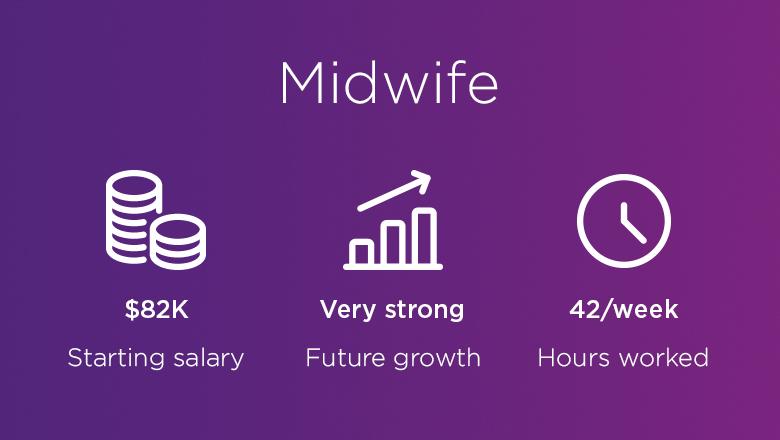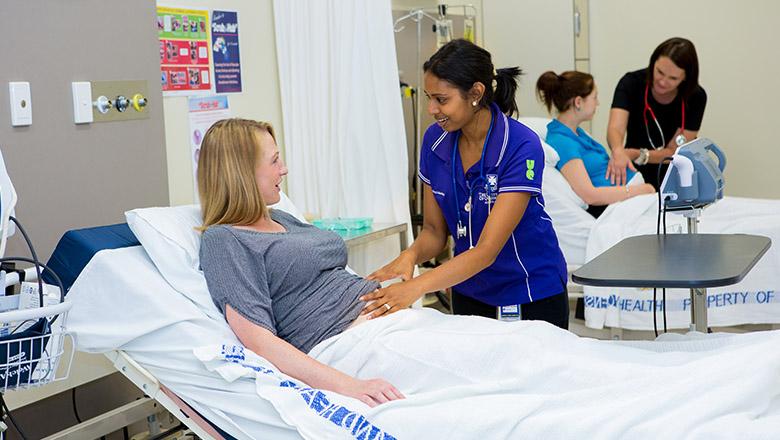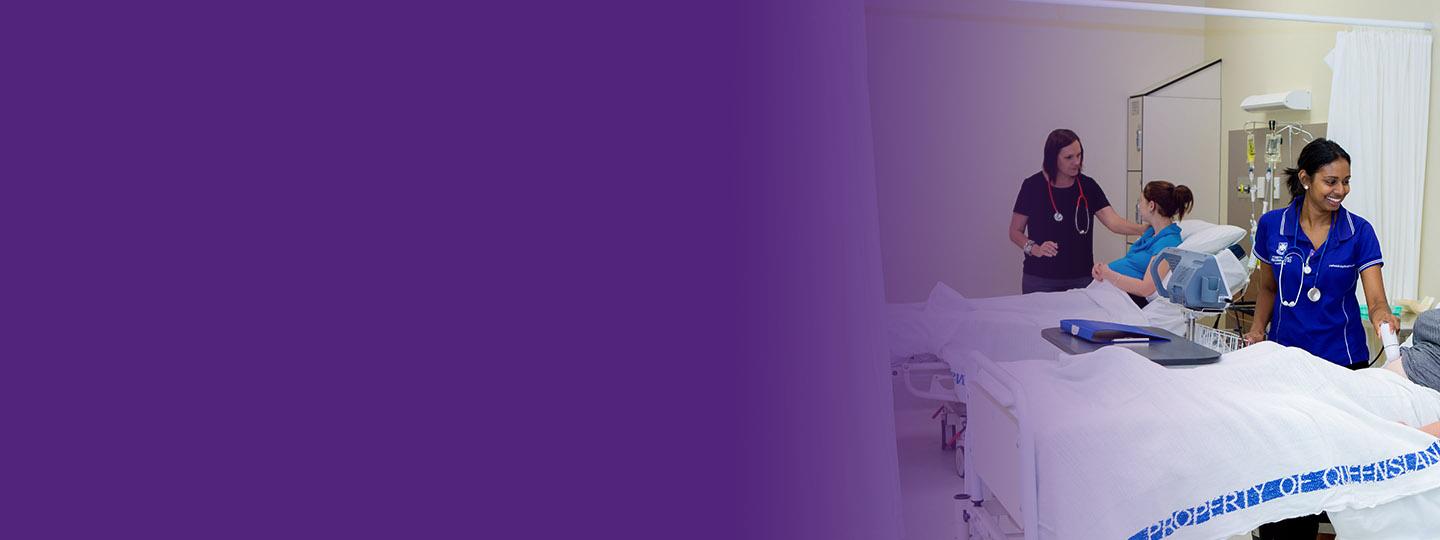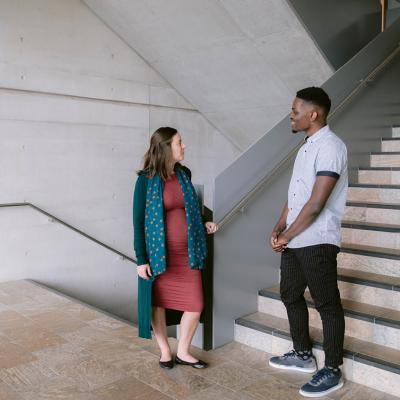The answer to this question may seem pretty obvious: you become a midwife. But the role of a midwife can encompass several stages of care, from prenatal to labour and birth, postnatal and neonatal.
As a midwife, you may choose to work across all areas of care for pregnant women and their babies or specialise in one. Midwives can also work in a variety of settings, including hospitals, birthing clinics, privately and in the community.
In this article, we'll answer some common questions around the midwife career path, including 'what do midwives do?' and 'what skills do you need to be a midwife?'. We'll also explore a few of the areas midwifery graduates may wish to specialise in during their midwife career.
Let's cover the essential questions first.
What does a midwife do?
Midwives are specialists in pregnancies and births without complications. The role of the midwife is to look after a pregnant woman and her baby during the phases of pregnancy (antenatal care), labour and birth, and for up to 28 days after the baby has been born (postnatal care). The duties of a midwife include:
- following women through their pregnancy, providing Continuity of Care
- examining, monitoring and assisting pregnant women
- monitoring the foetus during labour and looking out for any signs of abnormalities which may require a doctor
- assessing care requirements for pregnant women and women who have just given birth
- working with women and intended parents to educate and provide advice on how to care for their baby pre and post childbirth
- providing support and advice to women and families experiencing miscarriage and pregnancy loss.
What skills do you need to be a midwife?
The skills of a midwife encompass knowledge-based skills and have a woman-centred care focus. To excel as a midwife, you’ll need to be:
- patient
- compassionate
- able to work under pressure and stay calm in highly stressful situations
- confident providing advice and educating, without being condescending
- accepting of a wide range of cultural and religious beliefs
- willing to take charge and be responsible
- able to cope with mental and emotional distress.
How to become a midwife in Australia
Midwives can become qualified by completing a Bachelor of Midwifery. You don’t need to complete a Bachelor of Nursing first; however, you may wish to combine a Bachelor of Nursing / Bachelor of Midwifery to open up more career opportunities in the future.
Practising midwives must register with the Nursing and Midwifery Board of Australia. Some midwives have extra qualifications and can prescribe certain medications, or practise privately. Private midwives must also register with the Australian Health Practitioner Regulation Agency (AHPRA).

Information sourced from Talent, Your Career and Labour Market Insights.
Midwife career paths
Community midwifery
As mentioned above, midwives can work in a range of institutions and environments. A community midwife in Australia usually refers to a midwife who works in a model of care available to women experiencing a low-risk pregnancy and birth, who live in a designated catchment area.
The philosophy of community midwifery is to protect and support natural birth and to provide women with evidence-based, holistic care from experienced and known midwives throughout pregnancy, labour, birth and the postnatal period. Community midwifery can also include running antenatal classes outside of a hospital setting (at a clinic, community centre or even in the home) and birthing in a home setting.
A midwife can also work in a community collaboratively, in a Midwifery Group Practice. As a community midwife in a Midwifery Group Practice, you’ll work with a small team of midwives to develop relationships based on mutual trust and respect with the women in the community throughout their pregnancy journey.
Meet Victoria, a registered nurse and midwife at Logan Hospital
Victoria graduated from UQ’s Bachelor of Nursing / Bachelor of Midwifery in 2020 and is currently working as a registered midwife in the maternity inpatient unit at Logan Hospital.
Victoria says one of the things she loves most about her job is that every day is different.
“I’m responsible for caring for women, babies and their families in both the antenatal and postnatal periods,” she says.
“This involves helping families navigate the first few days of parenthood, which is an exciting journey.”
Pregnancy and parenthood can be incredibly moving, but also very overwhelming, and the role of the midwife is to offer support. Compassion, and an inherently caring nature, are two characteristics Victoria believes a person needs to be a good midwife.
“As well as this, it is integral to take initiative and work well in a team environment,” Victoria says.
Victoria shares three ways UQ's Bachelor of Nursing / Bachelor of Midwifery program prepared her for future opportunities:
- “The number of placement hours (1000+) exposes you to a wide array of hospital/community midwifery environments.”
- “The Continuity of Care program provides you with the opportunity to build rapport with women and their families throughout their pregnancy journey.”
- “The incredible lecturers and teaching staff provide you with evidence-based midwifery knowledge throughout the program, both in the classroom and clinical-based environments.”
International aid
Registered midwives have the opportunity to provide humanitarian aid to women in developing countries, or those affected by conflict and natural disaster. To offer aid internationally as a midwife, you can apply through a non-government organisation (NGO) such as the Red Cross.
You’ll need to follow the regulatory requirements of the country you wish to work in and may find that you need to undertake specialised training and health assessments to qualify as an international aid worker.
Adopting a midwifery model of care has been shown to greatly reduce maternal and neonatal morbidity and mortality in developing countries. For this reason, working in humanitarian aid as a midwife can be incredibly rewarding, but it’s also very challenging. It requires great strength of character, compassion, determination and teamwork. A willingness to travel is obviously essential, as is the expectation that you may need to give up the daily comforts you’re accustomed to.
Antenatal care
As a midwife, you may choose to specialise in antenatal care, which is sometimes also referred to as prenatal care. The role of a midwife in antenatal care is to work in partnership with pregnant women, their partners, families and intended parents, to provide support, advice, knowledge and assistance throughout pregnancy and before labour. A midwife specialising in antenatal care may work in a hospital, antenatal clinic, community organisation or privately.
Antenatal education involves running group or one-on-one classes to help pregnant women and their partners or family members, and intended parents, gain the skills and knowledge needed to care for a newborn baby. An antenatal midwife also offers advice and recommendations on how a pregnant woman can stay healthy and maximise comfort during pregnancy.

Neonatal care
Neonatal care refers to the care of predominantly well infants in the first 28 days of their life, in postnatal wards and the community. However, this type of care can also be with sick infants, in the neonatal intensive care unit (NICU).
To become a neonatal nurse, you must be a registered nurse and/or a registered midwife. Furthermore, you’ll need experience in this specialised area. You may be able to secure placement in a newborn care setting during your undergraduate studies, and/or be placed at a hospital with a neonatal ward upon graduation.
Neonatal nursing can be competitive and does take additional training. Gaining experience in newborn care during placements will put you in good stead for undertaking postgraduate studies in neonatal care, which will help you secure employment as a neonatal nurse.
Working in neonatal care can be confronting but incredibly rewarding. Neonatal nurses not only take care of sick babies, but they also provide emotional support to their parents, who are going through an extremely difficult time.
Want to know more about the types of careers you can pursue with a university degree in health and behavioural sciences?






